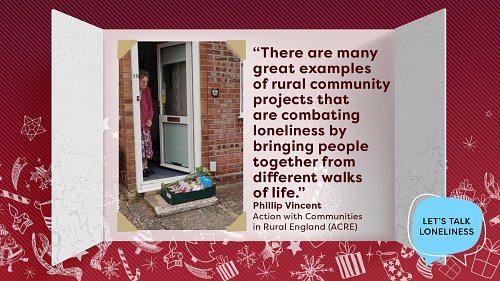Loneliness and rural isolation – guest blog for #LetsTalkLoneliness
Phillip Vincent, ACRE’s Public Affairs & Communications Manager blogs for the #LetsTalkLoneliness campaign
Long-term loneliness is believed to affect almost a fifth of the UK’s population. That feeling of missing or lacking quality social connections can eat away at a person’s health. It could even be as harmful as smoking 15 cigarettes a day – reducing life expectancy through increased risk of heart disease, stroke, depression and dementia.
There are lots of anecdotal reasons to believe that loneliness is a significant rural issue. ACRE Network members know all too well how physical isolation, limited services, transport links and connectivity can sometimes combine to leave people feeling terribly lonely, especially in rural communities with aging populations.
Whilst rural communities have certain vulnerabilities to this very human condition, they also have a long history of self-reliance and social entrepreneurship that connects people with one another at a local level.

Rural community projects and volunteering
This year we are celebrating 100 years of the ACRE Network. Community First Oxfordshire was set up in 1920 to provide better housing and access to services for country folk returning from the First World War, and many of England’s 10,000+ village halls date from the same period.
Today, there are many great examples of rural community projects combating loneliness by bringing people together from different walks of life. Good neighbour and village agents schemes can be found in almost every English county such as in Suffolk where people volunteer to run errands for more vulnerable members of their community.
In researching this blog, I was told about Tracey, a volunteer on this scheme who had been helping an elderly gentleman cope with the recent passing of his wife by helping him to transform his front garden during the Covid-19 lockdown. This was an interaction that reduced the gentleman’s feeling of loneliness but also enriched Tracey’s life too.
Another way of connecting people is community transport. Our member in Wiltshire, Community First operates ‘Link Schemes’ across the county which help residents over the age of 55 stay connected to vital services, by linking volunteer drivers (using their own cars), with passengers who have limited access to transport. Bringing people together
There are also a few outreach services such as the Rural Kent Coffee and Information Project which helps to tackle isolation and loneliness by providing a mobile pop-up cafe and information which tours the county. And in Somerset, our member has just launched Somerset Language Connect bringing together learners from minority ethnic communities who would like to improve their conversational English, with learning partners who aim to support them.
Of course, as my community development colleagues would point out, good initiatives aren’t always about reinventing the wheel! That’s why The Loneliness Campaign in North Yorkshire is aiming to connect and build upon existing activities provided by voluntary and community organisations across the county to tackle loneliness.
Looking ahead, we are hopeful these examples of good practice can be built upon as a model for how the community and voluntary sector can play an important role in combating this important public health concern.
Original article: https://letstalkloneliness.co.uk/loneliness-and-rural-isolation/


